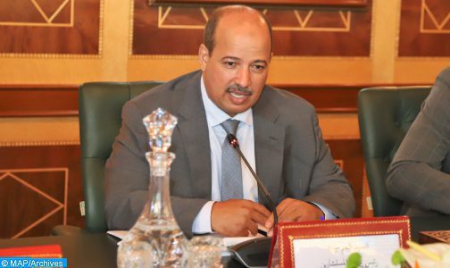Upper House Speaker Meets with Delegation from Abraham Accords Peace Institute
Laying the foundations for peace, security, cohabitation and mutual respect was the focus of talks held in Rabat on Wednesday by the House of Councillors’ Speaker Enaam Mayara with a delegation from the Abraham Accords Peace Institute, led by the Institute’s Executive Director, Robert Greenway, and attended by the former US Ambassador to Rabat, David Fischer. In a statement, the Upper House said that talks between the two parties focused on the importance of cooperation and joint action to lay the foundations for peace, security, coexistence and mutual respect in the Middle East and throughout the Arab region, particularly between the countries that signed the Abraham Accords in 2020. According to the same source, Mayara commended the work of the Abraham Accords Peace Institute in strengthening the age-old ties between the three monotheistic religions and the various human cultures, and in promoting multilateral dialogue between them in order to enshrine the culture of peace, moderation and rejection of intolerance, and contribute to ensuring the conditions for living together. Thee Upper House Speaker also reviewed the efforts made by the Kingdom, under the enlightened leadership of His Majesty King Mohammed VI, in His capacity as Commander of the Faithful and Chairman of the Al-Quds Committee, to establish security and peace in the Middle East region, and to support coexistence between the followers of the three Abrahamic religions. He also recalled “the excellent work of the Moroccan Parliament, and of the House of Councillors in particular, in promoting peace orientation, supporting peace and stability and consolidating mutual understanding,” underlining, in this context, “the commendable contribution of the Parliamentary Conference on Interfaith Dialogue hosted by Morocco last week in Marrakech in cooperation with the Inter-Parliamentary Union.” He stressed that, in his capacity as President of the Parliamentary Assembly of the Mediterranean, he would work to “strengthen the role of this regional parliamentary institution as a forum for peaceful discussion and dialogue between the different parties.” On the other hand, Mayara praised the historic position of the United States of America on the Moroccan Sahara issue, underlining the major importance of this position in preserving security and stability in the North African region and protecting it from the threats posed by the proliferation of separatist and terrorist groups, the spread of human trafficking and organized crime in the Tindouf camps and throughout the Sahel-Saharan region. For their part, Fischer and Greenway expressed their deep gratitude for the pioneering role played by Morocco in ensuring a secure future for the entire region, given its rich geographical and historical potential and its unique model of peace and stability, hailing in particular the far-sighted vision of His Majesty the King, as well as Morocco’s support for the Abraham Accords Peace Institute in achieving its main goals of strengthening economic and cultural ties and spreading peace between the signatory countries of these accords.

